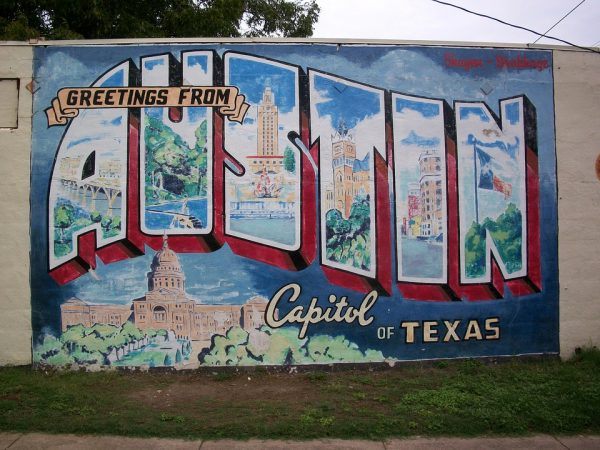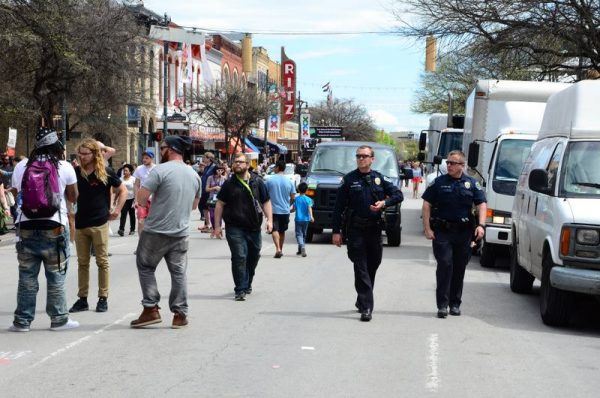Not much of a surprise that something like this would come out of the leftist enclave of Austin. What amazes me is that Austin is in Texas. I’m surprised the Texans haven’t packed it up and moved it to California or some other blue state bastion of political bewilderment.
I’ve written about how America’s leftist politicians have created not only sanctuary cities for illegal aliens but also de facto sanctuary cities for domestic criminals. That is if criminals happen to be “homeless.” Now, as reported by the LA Times, the Texas Capitol city council has voted unanimously (like good group-thinkers) to create the country’s first “Freedom City.” Of course, this term is consistent with good Orwellian thinking because the city will be the opposite of free.
So, what does a so-called freedom city look like? As far as I can tell, it creates a criminal oasis. Austin’s newest lefty policy directs police officers (you know, those people the City of Austin swore in to uphold the law) to ignore “low-level” offenses, including misdemeanor crimes.
These offenses include “smoking marijuana, having drug paraphernalia, and taking part in petty theft.” Taking part in? Way to take the edge off, Austin. What they mean is stealing someone else’s stuff, right? So, now it’s okay in Austin, Texas to not only to commit victimless crimes such as using marijuana but also crimes with victims such as taking someone’s property. But only if it’s not too expensive. Talk about a backdoor wealth redistribution! Nice job, Austin socialists.

As I understand it, in Texas, a theft becomes a felony when the value of the stolen property exceeds $1,500. Under that amount, the theft is a class A, B, or C misdemeanor (low-level) theft, again, depending on a value scale.
So, under this new measure, if some tweaker, needing to score another hit, comes on to your property and steals a lawnmower valued at $500, the cops have to ignore it. Do I have that right? It would seem so from what the city council is saying.
Those of us who warned about a slippery slope when liberal jurisdictions began ignoring local, state, and federal laws they didn’t like, were right. Apparently, the Austin City Council, in their finite wisdom, has reportedly taken this action because, as has become the norm in leftist cities and counties, they believe their cops are racist.
Austin City Councilman Greg Casar said, “Poor people of color in our city are over-punished and over-incarcerated.” And here’s where the true agenda becomes clearer. He added, “If people are being arrested less, we can also prevent people from being put in the deportation pipeline.”
Casar cites statistics showing the percentages of Latinos and black residents arrested for “low level” offenses compared with their percentages of the total population. However, according to Ken Casady, president of the Austin Police Association, Casar and other city council members are ignoring important factors. He says the police do arrest more blacks and Latinos, but there are legitimate, statistical reasons for it.
Not surprisingly, the reporter writing the story doesn’t mention those reasons. Well, it is the LA Times. But could a reason be that people in certain demographics commit crimes at a higher rate than others? That would be an interesting discussion…if only the left would be willing to have it.
But the story that demographic crime analysis tells doesn’t fit the narrative, does it? Anything that explains the numbers but doesn’t include racism is dismissed. And they call anyone who brings it up a racist. The lack of intellectual honesty is stunning. There is a school of thought where if a white cop working in a 90-percent black residential area stops more black drivers than white drivers, the officer is considered racist.
Casar cites a statistic of black residents being seven times more likely to be arrested for a marijuana offense than a white resident. Where is the breakdown of the stats? What are the racial demographics of the area in question? How many black people compared to white people live in the area? How many white offenders compared with black offenders do police stop?
Take the cocaine use and sales where I worked. There was a clear statistical reason for the disparity in arrests, but it didn’t include racism, so the data was dismissed. White offenders were more likely to use and sell powdered cocaine indoors. Black offenders tended to use and sell crack cocaine outdoors. On the streets, where witnesses can see and report them and where the cops work.

This is one reason the numbers of arrests get skewed, and it has nothing to do with racism. And while it may not be fair on the universal equity level, until they equip cops with x-ray glasses, so they can see through walls or until black offenders take their illegal drug selling and use off the streets, it’s not likely to change anytime soon. But racism is not the driving force behind arrests and convictions.
Regarding racial disparities in convictions, could it have anything to do with the indoor-outdoor dichotomy I mentioned? If you’re dealing in the streets, you tend to get caught more often. Your prior arrest and conviction record will be longer, thus the penalties at your sentencing will be more severe. Contrarily, if you limit your dealing and use to indoors, you’ll be caught less often. You’ll have a shorter rap sheet, and the sentences will tend to be less severe. Shouldn’t this view at least be in the conversation. If for nothing else, so the opponents can try to defeat this argument? No, it’s easier to ignore it than to defeat it.
Incidentally, murder and assault rates are also much higher in poor, black communities. Oh, and also, we cannot forget this most inconvenient fact: most of the victims of black crime are black. Any cursory stroll through the FBI crime stats will show these facts. I’m still looking for the racism here. But that’s a thing that doesn’t fit that pesky narrative.
Here’s another nod to the illegal immigration issue. Austin’s resolution also requires police officers to tell illegal immigrants that they don’t have to answer police questions about their immigration status. (Not sure how they will know, since in sanctuary cities, it’s illegal for cops to ask.) The article cites this facet of the “freedom city” edict as a part of the effort to “resist” President Trump’s policies against sanctuary cities. Freedom from responsibility for your criminal actions. How progressive is that?
Texas Governor Greg Abbott signed Senate Bill 4 which allows cops to ask an arrested or detained suspect about their immigration status. Whenever I’d arrest or detain someone, I’d get their I.D. and do a computer check for wants and warrants.
Lots of information comes up: driver’s license status, warrants for arrest, armed and dangerous, wanted by the military for AWOL or desertion, wanted for questioning by the Secret Service, and yes, previously deported felon and so on.
This information provides a law enforcement officer with information to help keep him or her and the community safe. A “freedom city” folds the law inside out. If you don’t respect and follow the laws you don’t like, why should anyone respect and follow the laws they don’t like? What happens to the respect for laws, generally, when cities like Austin, Texas decriminalize crime?
Before I close, I have to mention how publications like the LA Times, from which I’ve gleaned some information herein, bristle with offense when people accuse them of delivering “fake news.” But in reading the article I linked to above, people who believe the words chosen to deliver information must be accurate to be valid are disappointed.
Here’s what I mean. The LA Times refers to illegal immigrants solely as immigrants, thus conflating the terms and skewing the reporting on this issue. Or is there no difference between someone who enters or stays in a country legally or illegally? And now Austin’s city council is blurring the distinction between shoppers and shoplifters—you know, since committing the latter is now only a “low level” crime—well, if it doesn’t exceed $1,500.
Creating a “freedom city,” aside from being a criminal misuse of a euphemism, is yet another example of the causes of de-policing. If you take enough law enforcement tools away from the cops, you create a situation not where police officers don’t want to do their jobs but where they can no longer do their jobs.
Some officers will continue to do proactive policing despite city councils like the one in Austin, Texas passing measures that not only insult them but also handcuff them. The result: these men and women will be at a greater risk of physical harm, mental stress, and of being disciplined or even prosecuted just for doing real police work.
















